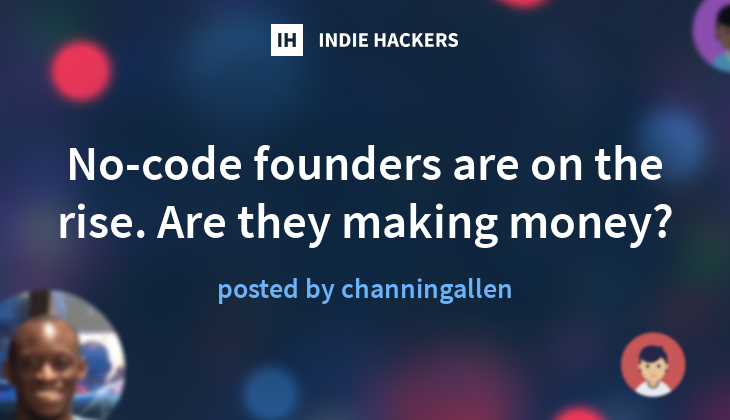
Last week I talked about how lockdown and the recession have spurred more people to start online businesses. No-code products are a big part of this story since many of the newly unemployed are coming from non-technical backgrounds.
But not all no-coders are in it to make money. @Tom_UK_Designer‘s no-code site The Edinburgh Lockdown Economy was growing exponentially when I interviewed him for last week’s article. But when I asked him about revenue, he told me he had no plans for monetization and sought instead to build a social following and grow his mailing list.
This got me wondering about the money-making mood among no-coders at large. I posted the following poll on Twitter to get a feel for the big picture:

Nearly 70% of the actual no-coders who answered the poll said their end-game was to build a business. This number is insanely high. Just imagine the same being true for coders: that 7 out of every 10 programmers you spotted at developer conferences or in the engineering departments of larger companies were really only making ends meet while starting their own businesses. If anything, I’d bet it’s closer to 3 in 10 for programmers. Which makes no-coders a uniquely entrepreneurial bunch.
They also face unique hurdles. Ben Tossell‘s the no-code founder behind Makerpad, an education platform that teaches people how to use no-code tools, including the very tools Ben used to build Makerpad itself. Ben stopped sharing his revenue numbers after raising an angel round from Earnest Capital, but we do have a snapshot of his first year or so of growth:

I asked Ben about the challenges no-coders face building revenue-generating businesses, and here’s what he told me:
Both [coders and no-coders] see similar hurdles to making money, [but] no-coders see more as they can’t as easily offer software as the product itself.
Ben’s distinction here is subtle, but crucial. By definition, every online business uses software in some capacity, but for software to “be” the product, the software itself has to be the main thing customers are paying for. Substack, for example, is a software product, but the paid newsletters built on Substack are information products.
Since software products tend to be powered by sophisticated codebases, most of today’s thriving no-code businesses are either selling connections to people (e.g. online communities, coaching and mentorship programs, virtual conferences and meetups, etc.), access to information, or some combination of the two.
These businesses can become massively successful. In a recent episode of the Indie Hackers podcast, Ben was quick to set his own example aside and point out that the coding bootcamp Lambda School, now valued at $150 million, was built with no-code tools.

I spoke to several no-code founders over the weekend, and the twin themes of education and human connection showed up in nearly every case:
And we can expect a lot more where they came from. Not just because the economy is producing more no-coders, and not just because no-coders are so business-minded. But because the no-code ecology as a whole is evolving.
Many popular no-code tools like Notion, Parabola, and Substack have only been around for a few years, and resources like Makerpad and Michael Gill‘s no-code automation book Maker Minions are newer still. Founders like Gonçalo Henriques of NoCodery are even building profitable job boards for no-coders, because larger companies are beginning to recognize no-code as a skill worth hiring for.
I’m doing a couple of these roundups a week! My aim is to keep ahead of the curve on issues affecting indie hackers and forward the message along to you.
You can subscribe here to receive future articles in this series.